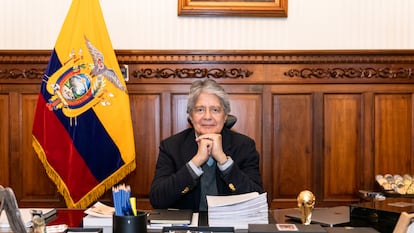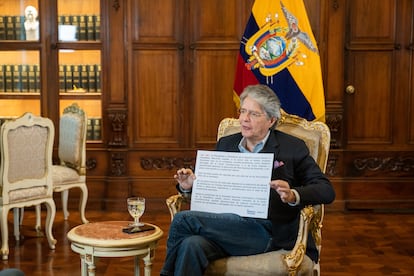Guillermo Lasso: ‘I’ve chosen to govern for six months in purgatory, rather than governing for two years in hell’
The Ecuadorian president spoke to EL PAÍS a day after dissolving the country’s National Assembly and calling early elections. He feels he is a victim of political persecution over increased drug confiscations and a battle against corruption


The president of Ecuador, Guillermo Lasso, is eager to explain the actions he took on Wednesday, when he dissolved the country’s National Assembly and called early legislative and presidential elections. Five months ago, another South American president, Peru’s Pedro Castillo, also announced the dissolution of congress in a televised address. The move, made hours before Castillo was to face a third no-confidence vote, represented a kind of improvised coup d’état — and saw him end up in prison. Lasso stresses that what has happened in Ecuador this week is very different. He has triggered article 148 of the country’s constitution, a provision known as muerta cruzada, or “mutual death.” It gives him the power to dissolve congress if there is a serious political crisis. On a table next to where he is sitting, there is a print-out of the terms of the article. Lasso holds it up several times during our interview, even reading one of its paragraphs in full at one point. It’s his way of saying that what he has done is legal.
Lasso believes he had good reason for his decision. He sees himself as a victim of persecution by certain factions that have sought to have him removed from office four times in two years. A day before dissolving congress, the president appeared in the National Assembly to defend himself amid an impeachment process initiated against him over alleged embezzlement. At that point, he already knew that the following day he would strike a blow that would halt the trial, sending lawmakers home before they could vote on his potential removal. Lasso denies that it was a move designed to sidestep impeachment; rather, he says, it was the country’s only way forward.
Sitting in his office on Thursday, the slightly built Lasso, who favors a blazer and jeans, looks as calm as ever. He has barely slept over the past two days, but he says he feels better now than at any point in the last five months. He will no longer have to contend with an opposition-led congress and, governing by decree, aims to do in six months what he had planned to do in two years. Ecuador’s security situation is as fragile as it has ever been, but the president insists that his measures are beginning to bear fruit, with homicides down over the past month. He wants to keep on working on that as the country prepares for another election, just two years after he came to power.
Lasso refuses to be drawn on whether he’ll run for the presidency again, saying that this is not the time to think about that. However, he seems to suggest that he’s likelier not to seek re-election, telling EL PAÍS: “I’d really like to see my grandchildren grow up in person, rather than in photos or videos on WhatsApp.”
Question. What will you do as president in the coming months?
Answer. I’ll govern Ecuador with a particular focus on four issues: citizen security, health, education and infrastructure. We’ll try to do in six months what we had intended to do in two years.
Q. You’re a staunch defender of democracy, and the National Assembly is a pillar of the Ecuadorian democratic system. Do you feel comfortable ruling by decree?
A. Let’s make one thing clear right from the start: you don’t get to rule by decree all on your own. The terms of article 148 of the constitution clearly say that I can issue economic emergency executive orders, nothing else, and that they have to be approved by the Constitutional Court. So I’m not governing on my own. The Constitutional Court acts as a counterbalance to the executive branch.
Q. Ahead of the snap ballot that you’ve called, won’t the electoral process be distorted by a build-up in which there is no Congress as counterweight to you as president?
A. This is Ecuador’s first experience of the application of article 148, which allows the president to dissolve the National Assembly. I’ll be honest with you: the regime in Ecuador is a presidential regime, and this article, 148, corresponds more to a parliamentary regime. There’s a kind of hybrid there. I’ve never liked it, but I had no option but to apply it in the face of the gridlock caused by part of the National Assembly, leading to a political crisis without a solution.
Q. Who is behind what you consider to be a political persecution?
A. In my two years in government, there have been four attempts to remove me from office. I don’t want to believe that this has happened because my government has confiscated 420 tons of drugs in two years — five times the amount confiscated by the two previous governments in the 15 years before my administration. And I also don’t want to believe that I’ve been facing a political trial because I’ve fought against corruption when it comes to insurance, when it comes to an assault on the national police’s social security system; or because I’ve fought against corruption in the oil industry and against those who seek to control state companies as if they were their own personal assets.
Q. Are you saying that there are links between drug trafficking and the Ecuadorian political world?
A. That’s what I’m saying. Unfortunately, in the 15 years before my government, a kind of relationship between politics and drug trafficking was formed.
Q. Can you point the finger at a particular political group?
A. I’m not going to do that. Obviously, when the time comes I’ll do so with evidence to back that up, not just a statement based on the experience I have of this issue.
Q. Do you feel supported?
A. I did it [dissolved Congress] because I felt supported by public opinion, by the citizens of this country.
Q. Do you feel a greater degree of support now than in February, when a majority of voters rejected your proposals in a referendum?
A. I think so. The level of gridlock in the National Assembly, and the way it was behaving, was something that we couldn’t have envisioned.
Q. Do you believe you would have lost the impeachment vote?
A. The decision I made goes beyond an analysis of that. I went to the National Assembly on Tuesday, I fronted up, I defended myself and I offered clear arguments. Firstly, we’re talking about contracts signed under the previous government, not mine. Secondly, we’re talking about a report by the comptroller’s office about contracts signed under the previous government, not mine. And in the report, there is no recommendation that the contracts should be suspended; it limits itself to making three technical recommendations that I applied, and that as a consequence saw the [state oil transportation] company Flopec go from losing $50 million a year to earning $180 million. State companies are autonomous — they don’t allow for the interference of the president of the Republic. They are governed by their own administrator. A crime has been invented that doesn’t even exist in Ecuador’s criminal code: embezzlement by omission. In other words, embezzlement through not having acted when I had no reason to act, because they’re independent companies.
Q. When you defended yourself in the National Assembly on Tuesday, did you already know that you were going to dissolve Congress the following day?
A. I had to do that [go to Congress]. I owed it to myself, to my family, to my supporters and to every citizen of Ecuador. I couldn’t trigger muerte cruzada before appearing in Congress, because that would have looked very bad. I wanted to carry out the process to the letter: go to Congress to defend myself, face the whole country, and then make the decision I made.
Q. Is it a way of sidestepping your impeachment trial?
A. I was confident about the votes I’d get: the opposition didn’t have enough votes to remove me from office. But this isn’t a question of votes. It’s a question that goes beyond that: I’ve chosen to govern for six months in purgatory, rather than governing for two years in hell.
Q. What day did you know that you were going to apply article 148?
A. It’s a hugely significant decision. It’s not like choosing between vanilla or chocolate ice cream. It’s a decision that affects 18 million Ecuadorians, that affects Ecuador’s international relations. It’s something that I’ve had in my head pretty much throughout my tenure. Why? Because of the attempts to remove me from office.
Q. Are you going to run in the next elections?
A. That’s a subject that I’m not thinking about for now. My priority is to work on the security of the Ecuadorian people. We’re making progress on the security situation in the province of Esmeraldas, which has been the country’s most violent province in recent years. We’ve now gone a month with practically no violent deaths. The state of emergency has worked, the support of the armed forces has worked, and the message of declaring organized criminal groups as terrorists has really frightened them.

Q. Were you to run for president, would you win the election?
A. I’m not going to speculate about scenarios that I’m not currently thinking about.
Q. But you must have discussed it with those closest to you.
A. Of course. With my children, with my wife… I’d also really like to see my grandchildren grow up in person, rather than in photos or videos on WhatsApp. So yes, of course. I’ve dedicated nearly 15 years of my life to politics and, well, it’s demanding. In this job, you work 17 hours a day. On Tuesday, I started at 7am and didn’t go to bed until Wednesday at 11pm.
Q. February’s local elections in Ecuador saw strong support for Correísmo, the political movement built around former president Rafael Correa. Aren’t you giving it a greater chance of returning to power by calling early elections?
A. No. In a sense, this is a call to the political class, to the tendency that I represent, for a kind of national agreement that allows us to preserve democracy, to preserve liberal democratic principles and humanist policies like the ones that we’ve applied in the first two years of my government.
Q. Correa also considers himself a victim of political persecution. What are your thoughts on his situation?
A. To be honest, it’s such an old subject now that, in a way, the time for analysis of the issue has expired.
Q. But his name is still current.
A. Names don’t expire, but political careers do.
Q. Do you think his political career is over?
A. He can’t take part in electoral processes, because he has a conviction against him.
Q. So Correa doesn’t decide candidates or pull the strings in his party from exile in Belgium?
A. Without doubt. We’re not going to deny that he remains politically active, contributing to his party’s success in the mayoral elections in Quito and Guayaquil [in February].
Q. Earlier in this interview, you claimed that the impeachment process against you was a reaction to the increased confiscation of drugs. But isn’t it also true that the presence of criminal groups has risen in Ecuador?
A. No. What we’ve done is attack their economic structure and discourage them. We’ve worked with the Ecuadorian and Colombian armed forces in the border region and have managed to pretty much deactivate 110 cocaine laboratories with a capacity to produce 2,500 tons a year. It’s not that there are new groups — on the contrary. The actions taken by this government have discouraged drug trafficking on Ecuadorian soil.
Q. In response, the country is witnessing its worst ever wave of violence.
A. Is witnessing? No, we’ve improved things substantially. There can be no doubting that in August or September 2021, after I had come to power and we began taking a strong stance in terms of drug confiscation, these transnational criminal groups realized that in Ecuador there was a government that was going to face up to them in the way we have.
Q. Do you accept that you have made mistakes over the course of these two years?
A. My government, like any other in the world, isn’t perfect. I’ve made mistakes when it has come to communication. That’s something we’re now correcting. It was a consequence of focusing on action: on delivering results over communicating these results. And in politics, what isn’t communicated doesn’t exist.
Q. It’s said that there are no good governments with bad communication.
A. I’ve unquestionably experienced that first-hand.
Q. Is it striking to you that you have dissolved Congress, yet nobody has taken to the streets in protest?
A. At this moment in time, I don’t find it very striking, because the National Assembly’s reputation had deteriorated to the point where its approval rating fell to 2% or 3%. If you do an online poll, you’ll find that the dissolution of Congress has an approval rating of 73%. What’s being seen on social media is a reflection of what’s happening on the streets, where there is absolute normality.
Q. Before going into politics, you were a banker for many years. Is it harder than you expected to make changes to the country?
A. In economic terms, Ecuador has a structure of fuel subsidies that is equivalent to 3.5% of its gross domestic product, close to $4 billion. It’s difficult to make changes because of the social impact of these subsidies. They’ve somehow become generalized and aren’t focused on the most vulnerable sections of society. That’s a change that is really difficult to make.
Q. You’re a self-made man, becoming a successful banker despite being born into a family of modest resources. How did you amass a fortune that led you to have 14 financial enterprises in Panama and the United States? [This was revealed in the Pandora Papers, a global investigation coordinated by the International Consortium of Investigative Journalists (ICIJ), in which EL PAÍS participated and the newspaper El Universo took the lead in Ecuador.]
A. What you say isn’t true. I have never had any such enterprises anywhere in the world. Where I am a shareholder, and I made that clear in my declaration of assets when I took office, is the Banco de Guayaquil. How do you come to have such assets? By working very hard from the age of 15. A friend of mine said to me: You’re very lucky in life. And I replied: Yes, the harder I work, the luckier I get.
Q. Do you fear leaving office with the feeling that you haven’t completed the job?
A. These last few weeks have been weeks devoted to reflecting on whether or not to make the decision to trigger article 148 of the constitution. My conscience is clear; we’ve achieved a lot.
Sign up for our weekly newsletter to get more English-language news coverage from EL PAÍS USA Edition
Tu suscripción se está usando en otro dispositivo
¿Quieres añadir otro usuario a tu suscripción?
Si continúas leyendo en este dispositivo, no se podrá leer en el otro.
FlechaTu suscripción se está usando en otro dispositivo y solo puedes acceder a EL PAÍS desde un dispositivo a la vez.
Si quieres compartir tu cuenta, cambia tu suscripción a la modalidad Premium, así podrás añadir otro usuario. Cada uno accederá con su propia cuenta de email, lo que os permitirá personalizar vuestra experiencia en EL PAÍS.
¿Tienes una suscripción de empresa? Accede aquí para contratar más cuentas.
En el caso de no saber quién está usando tu cuenta, te recomendamos cambiar tu contraseña aquí.
Si decides continuar compartiendo tu cuenta, este mensaje se mostrará en tu dispositivo y en el de la otra persona que está usando tu cuenta de forma indefinida, afectando a tu experiencia de lectura. Puedes consultar aquí los términos y condiciones de la suscripción digital.








































